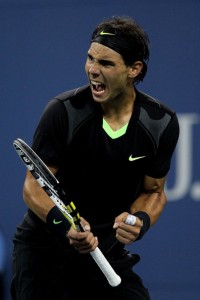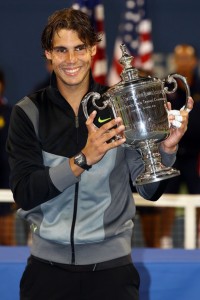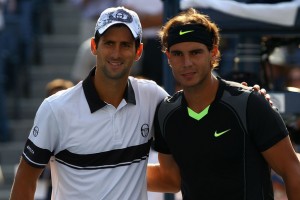Rafael Nadal Reaches The Career Grand Slam
With Monday’s victory over Novak Djokovic in the US Open final, Rafael Nadal joins Rod Laver, Andre Agassi and Roger Federer as the only Open era players to have won the career Grand Slam.
He and Agassi, Federer, and Jimmy Connors are the only men to have won majors on clay, grass, and hard courts. With nine major titles, he moves past Connors, Agassi and Ivan Lendl in terms of the number of majors won. He is the first man since Laver in 1969 to have won Roland Garros, Wimbledon and the US Open in the same year.
All in all, a pretty successful climb back from the thrashing he received at last year’s event. How he did it surely leaves some questions, and here are answers to a few of them.
Nadal won no tournaments for nearly a year. Then, starting in May, he has won nearly everything that counts. How does he do it?
The Spaniard rides momentum to a degree that I don’t think we’ve ever seen. Federer was solid pretty much throughout the season during his best years, but Nadal’s game centers around how well he’s hitting through his groundstrokes. At last year’s Open he had a persistent ab injury and ran into a really hot hand in Juan Martin del Potro, but the real reason the lopsided scoreline was that he had no wind at his back.
When he’s not feeling particularly confident, his groundstrokes can sit up, particularly on hard courts, and even his movement suffers. Clay has a way of revitalizing his play and that success carries over to other surfaces. It has ever since his first Wimbledon final of 2006.
[poll id=”132″]
But what’s really key for Nadal is what he does during his dry spells. Prior to his maiden Wimbledon win in 2008, he was working to turn his backhand into a weapon. Players had always tried to get away from his heavy spinning forehand, but suddenly they found that getting it to the backhand would only result in a flat slingshot that whistled through the court and generated more than its share of winners. Once clay had restored his confidence in the forehand, he was even tougher from the backcourt.
During his dearth of momentum this year, his biggest change seems to have been on serve. That was evident even in this year’s Australian Open, when he otherwise was struggling. Then, this summer he capped an undefeated clay court season by matching the 6’4”, 200-pound Robin Soderling ace for ace in the RG final.
And that serve had grown even bigger for this event. In today’s final, he outperformed Djokovic in every serving category that mattered: hitting 8 aces to 5, just 2 double faults to 4, and winning a greater share of first and second serve points.
When Nadal started contending for Slams in 2005, it was not uncommon for him to play a five-set match with no aces. His athletic pedigree cannot be denied, but he’s also that rare competitor whose confidence doesn’t blind him to the ways he can improve.
So is he going to break Federer’s mark of 16 majors? Beware all such predictions. Last spring Nadal looked all but certain to win his fifth straight RG, but we know what happened. When Federer won the Australian Open at the beginning of the year, anyone who predicted that he’d not reach another major final in 2010 would probably have been mocked mercilessly.
I’d be surprised if Nadal doesn’t overtake Roy Emerson at 12, but he’d need another two or three near-perfect seasons to overtake Federer’s mark. And for players who have been grinding on tour for as long as he has, the wheels can come off remarkably fast.
Which is all the more reason to treasure this era, with both Federer and Nadal contending for Slams. Federer has been reliable in the last weekend of majors for a long time, and his status as an ambassador for the game has only grown during that period. While Nadal’s personality may not be as gregarious as Federer’s nor his game as smooth, there has never been a player so unfailingly polite off court and so rigidly unyielding on it.
What’s next for Novak Djokovic? With two quarterfinals, a semi and a final to his credit, the Serb has emerged as the third-best performer at the majors. The big impediment to his winning one is that his career started later than the other two, so he’s only been ranked higher than one of them for brief periods, and never ahead of them both. This means that he’s consistently got to beat one of them in the semis of a major which, even if he can pull it off, has to take a lot out of a player mentally and physically.

Nadal plays with an intensity that makes it likely he will soon build on his nine career Grand Slam titles.
The good news is that he’s still quite a bit younger than Federer and has done less damage to his body than Nadal, so draws shouldn’t always be so intimidating. I see more Slams in his future.
Will Federer win more majors? When he lost to Nadal at last year’s AO, it looked like breaking Sampras’ record would be a struggle. When he won the RG and Wimbledon later that year, it looked like he might start challenging the mark set by Steffi Graf.
After his Wimbledon mark last year I picked 18 majors, and I’m sticking to that. Unlike in the middle of the decade, he cannot summon Grand Slam victories at will, and there are now a few players who believe they can beat him. But Federer is too accustomed to winning and too gifted not to figure it out a couple of more times.
Does this win make Nadal the GOAT? Who cares?


I like the way the sea seemed to part for Nadal, as all the really tough opposition melted away before he had to meet them. That has to do with "luck" however, which no one seems to include as a key ingredient in winning a slam. You must thank the tennis gods a bit. That, of course, has nothing to do with Nadal. He just faced the players he had to in his draw. But he really had no serious challenger until his final match where he executed, as you point out, with supreme confidence. He had every reason to feel confident. Nadal has enjoyed a supreme run, one of the best ever.
"He (Nadal) and Agassi, Federer, and Jimmy Connors are the only men to have won majors on clay, grass, and hard courts."
Don't forget Mats Wilander. He won Australian Open grass titles.